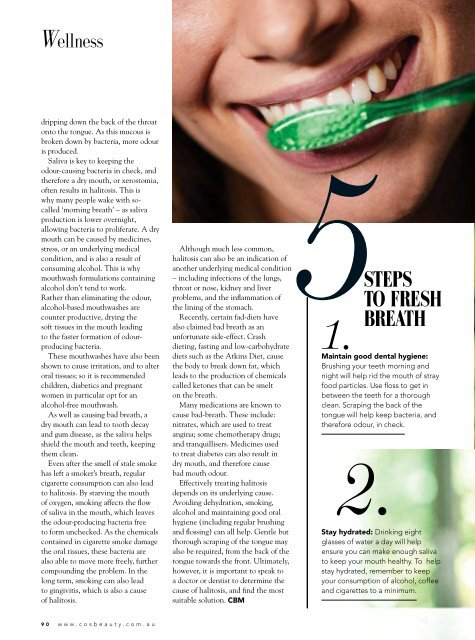CosBeauty Magazine #81
CosBeauty is the #BeautyAddict's guide to lifestyle, health and beauty in Australia. In this issue we look at: • Essential Exfoliation - Smooth Skin for Spring • Why your Beauty Sleep is really important • 40 over 40 - Anti-ageing must have products • Tassie Road Trip • Lauren Hannaford - FHIT for Life • Face Value - Facial Surgeries explained
CosBeauty is the #BeautyAddict's guide to lifestyle, health and beauty in Australia. In this issue we look at:
• Essential Exfoliation - Smooth Skin for Spring
• Why your Beauty Sleep is really important
• 40 over 40 - Anti-ageing must have products
• Tassie Road Trip
• Lauren Hannaford - FHIT for Life
• Face Value - Facial Surgeries explained
You also want an ePaper? Increase the reach of your titles
YUMPU automatically turns print PDFs into web optimized ePapers that Google loves.
Wellness<br />
dripping down the back of the throat<br />
onto the tongue. As this mucous is<br />
broken down by bacteria, more odour<br />
is produced.<br />
Saliva is key to keeping the<br />
odour-causing bacteria in check, and<br />
therefore a dry mouth, or xerostomia,<br />
often results in halitosis. This is<br />
why many people wake with socalled<br />
‘morning breath’ – as saliva<br />
production is lower overnight,<br />
allowing bacteria to proliferate. A dry<br />
mouth can be caused by medicines,<br />
stress, or an underlying medical<br />
condition, and is also a result of<br />
consuming alcohol. This is why<br />
mouthwash formulations containing<br />
alcohol don’t tend to work.<br />
Rather than eliminating the odour,<br />
alcohol-based mouthwashes are<br />
counter productive, drying the<br />
soft tissues in the mouth leading<br />
to the faster formation of odourproducing<br />
bacteria.<br />
These mouthwashes have also been<br />
shown to cause irritation, and to alter<br />
oral tissues; so it is recommended<br />
children, diabetics and pregnant<br />
women in particular opt for an<br />
alcohol-free mouthwash.<br />
As well as causing bad breath, a<br />
dry mouth can lead to tooth decay<br />
and gum disease, as the saliva helps<br />
shield the mouth and teeth, keeping<br />
them clean.<br />
Even after the smell of stale smoke<br />
has left a smoker’s breath, regular<br />
cigarette consumption can also lead<br />
to halitosis. By starving the mouth<br />
of oxygen, smoking affects the fl ow<br />
of saliva in the mouth, which leaves<br />
the odour-producing bacteria free<br />
to form unchecked. As the chemicals<br />
contained in cigarette smoke damage<br />
the oral tissues, these bacteria are<br />
also able to move more freely, further<br />
compounding the problem. In the<br />
long term, smoking can also lead<br />
to gingivitis, which is also a cause<br />
of halitosis.<br />
Although much less common,<br />
halitosis can also be an indication of<br />
another underlying medical condition<br />
– including infections of the lungs,<br />
throat or nose, kidney and liver<br />
problems, and the infl ammation of<br />
the lining of the stomach.<br />
Recently, certain fad-diets have<br />
also claimed bad breath as an<br />
unfortunate side-effect. Crash<br />
dieting, fasting and low-carbohydrate<br />
diets such as the Atkins Diet, cause<br />
the body to break down fat, which<br />
leads to the production of chemicals<br />
called ketones that can be smelt<br />
on the breath.<br />
Many medications are known to<br />
cause bad-breath. These include:<br />
nitrates, which are used to treat<br />
angina; some chemotherapy drugs;<br />
and tranquillisers. Medicines used<br />
to treat diabetes can also result in<br />
dry mouth, and therefore cause<br />
bad mouth odour.<br />
Effectively treating halitosis<br />
depends on its underlying cause.<br />
Avoiding dehydration, smoking,<br />
alcohol and maintaining good oral<br />
hygiene (including regular brushing<br />
and fl ossing) can all help. Gentle but<br />
thorough scraping of the tongue may<br />
also be required, from the back of the<br />
tongue towards the front. Ultimately,<br />
however, it is important to speak to<br />
a doctor or dentist to determine the<br />
cause of halitosis, and fi nd the most<br />
suitable solution. CBM<br />
5<br />
STEPS<br />
TO FRESH<br />
BREATH<br />
1.<br />
Maintain good dental hygiene:<br />
Brushing your teeth morning and<br />
night will help rid the mouth of stray<br />
food particles. Use floss to get in<br />
between the teeth for a thorough<br />
clean. Scraping the back of the<br />
tongue will help keep bacteria, and<br />
therefore odour, in check.<br />
2.<br />
Stay hydrated: Drinking eight<br />
glasses of water a day will help<br />
ensure you can make enough saliva<br />
to keep your mouth healthy. To help<br />
stay hydrated, remember to keep<br />
your consumption of alcohol, coffee<br />
and cigarettes to a minimum.<br />
90 www.cosbeauty.com.au

















